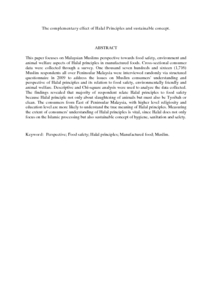Citation
Mohamed, ZainalAbidin and Rezai, Golnaz and Shamsudin, Mad Nasir
(2011)
The complementary effect of Halal Principles and sustainable concept.
Journal of Environmental Science and Engineering, 5 (5).
pp. 652-659.
ISSN 1934-8932
Abstract
This paper focuses on Malaysian Muslims perspective towards food safety, environment and animal welfare aspects of Halal principles in manufactured foods. Cross-sectional consumer data were collected through a survey. One thousand seven hundreds and sixteen (1,716) Muslim respondents all over Peninsular Malaysia were interviewed randomly via structured questionnaire in 2009 to address the issues on Muslim consumers' understanding and perspective of Halal principles and its relation to food safety, environmentally friendly and animal welfare. Descriptive and Chi-square analysis were used to analyze the data collected. The findings revealed that majority of respondent relate Halal principles to food safety because Halal principle not only about slaughtering of animals but must also be Tyoibah or clean. The consumers from East of Peninsular Malaysia, with higher level religiosity and education level are more likely to understand the true meaning of Halal principles. Measuring the extent of consumers' understanding of Halal principles is vital, since Halal does not only focus on the Islamic processing but also sustainable concept of hygiene, sanitation and safety.
Download File
![[img]](http://psasir.upm.edu.my/23596/1.hassmallThumbnailVersion/The%20complementary%20effect%20of%20Halal%20Principles%20and%20sustainable%20concept.pdf)  Preview |
|
PDF (Abstract)
The complementary effect of Halal Principles and sustainable concept.pdf
Download (83kB)
| Preview
|
|
Additional Metadata
Actions (login required)
 |
View Item |

